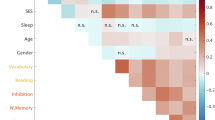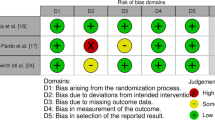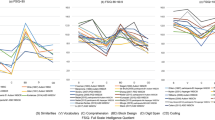Abstract
Introduction
This study aimed to document cognitive outcomes in children treated for brain tumours with surgery and/or chemotherapy before the age of 3 years and to investigate the relationship between treatment factors and cognitive outcome.
Materials and methods
Participants were 31 children aged 7–14 years who had been diagnosed and treated for brain tumours under the age of 3 years. Neuropsychological assessment included tests of cognitive functioning (WASI), memory (CMS) and executive functioning (BADS-C).
Results and discussion
IQ and memory functioning scores were within the normal range but executive function was significantly below the expected level. Lower socio-economic status, younger age at treatment, having undergone more than one surgical intervention, motor problems and speech and language difficulties were found to be related to cognitive functioning. Although this group of children have good outcomes in terms of IQ and memory they have significant difficulties with executive functioning.
Conclusion
Further research in this area is needed to allow for development of appropriate support packages for those who are most at risk.

Similar content being viewed by others
References
Aarsen FK, Van Dongen HR, Paquier PF, Van Mourik M, Catsman-Berrevoets CE (2004) Long-term sequelae in children after cerebellar astrocytoma surgery. Neurology 62:1311–1316
Aram DM, Ekelman BL, Nation JE (1984) Preschoolers with language disorders. J Speech Hear Res 27:232–244
Beebe DW, Ris MD, Armstrong FD, Fontanesi J, Mulhern R, Holmes E, Wisoff JH (2005) Cognitive and adaptive outcome in low-grade pediatric cerebellar astrocytomas: evidence of diminished cognitive and adaptive functioning in national collaborative studies. J Clin Oncol 22:5198–5204
Karatekin C, Lazareff JA, Asarnow RF (2000) Relevance of the cerebellar hemispheres for executive functions. Neurology 22:106–112
Meyer EA, Kieran MW (2002) Psychological adjustment of ‘surgery-only’ pediatric neuro-oncology patients: a retrospective analysis. Psycho-oncol 11:74–79
Moore BD, Ater JL, Copeland DR (1992) Improved neuropsychological outcome in children with brain tumors diagnosed during infancy and treated without cranial irradiation. J Child Neurol 7:281–290
Mulhern RK, Butler RW (2004) Neurocognitive sequale of childhood cancers and their treatment. Pediatr Rehabil 7(1):1–14
Mulhern RK, Merchant TE, Gajjar A, Reddick WE, Kun LE (2004) Late neurocognitive sequelae in survivors of brain tumours in childhood. Oncology 5:399–408
Mulhern RK, Reddick WE, Palmer SL, Glass JO, Elkin TD, Kun LE et al (1999) Neurocognitive deficits in medulloblastoma survivors and white matter loss. Ann Neurol 46(6):834–841
Richter S, Schoch B, Kaiser O, Groetschel H, Hein-Kropp C, Maschke M, Dimitrova A, Gizewski ER, Ziegler W, Karnath HO, Timmann D (2005) Children and adolescents with chronic cerebellar lesions show no clinically relevant signs of aphasia or neglect. J Neurophysiol 94:4108–4120
Riva D, Pantaleoni C, Devoti M, Saletti V, Nichelli F, Giorgi C (1998) Late neuropsychological and behavioural outcome of children surgically treated for craniopharyngioma. Child’s Nerv Syst 14:179–184
Ronning C, Sundet K, Due-Tonnessen B, Lundar T, Helseth E (2005) Persistent cognitive dysfunction secondary to cerebellar injury in patients treated for posterior fossa tumors in childhood. Pediatr Neurosurg 41(1):15–21
Shiminski-Maher T, Rosenberg M (1990) Late effects associated with treatment of childhood craniopharyngiomas. J Neurosci Nurs 22:220–226
Steinlin M, Imfeld S, Zulauf P, Boltshauser E, Lovblad KO, Luthy AR, Perrig W, Kaufmann F (2003) Neuropsychological long-term sequelae after posterior fossa tumour resection during childhood. Brain 126(9):1998–2008
Stiles J (2000) Neural plasticity and cognitive development. Dev Neuropsychol 18(2):237–272
Tong S, Baghurst P, Vimpani G, McMichael A (2007) Socioeconomic position, maternal IQ, home environment, and cognitive development. J Pediatr 151(3):284–288
Wocadlo C, Rieger I (2003) Motor impairment and low achievement in very preterm children at eight years of age. Early Hum Dev 84(11):769–776
Author information
Authors and Affiliations
Corresponding author
Rights and permissions
About this article
Cite this article
Ward, C., Phipps, K., de Sousa, C. et al. Treatment factors associated with outcomes in children less than 3 years of age with CNS tumours. Childs Nerv Syst 25, 663–668 (2009). https://doi.org/10.1007/s00381-009-0832-8
Received:
Published:
Issue Date:
DOI: https://doi.org/10.1007/s00381-009-0832-8




